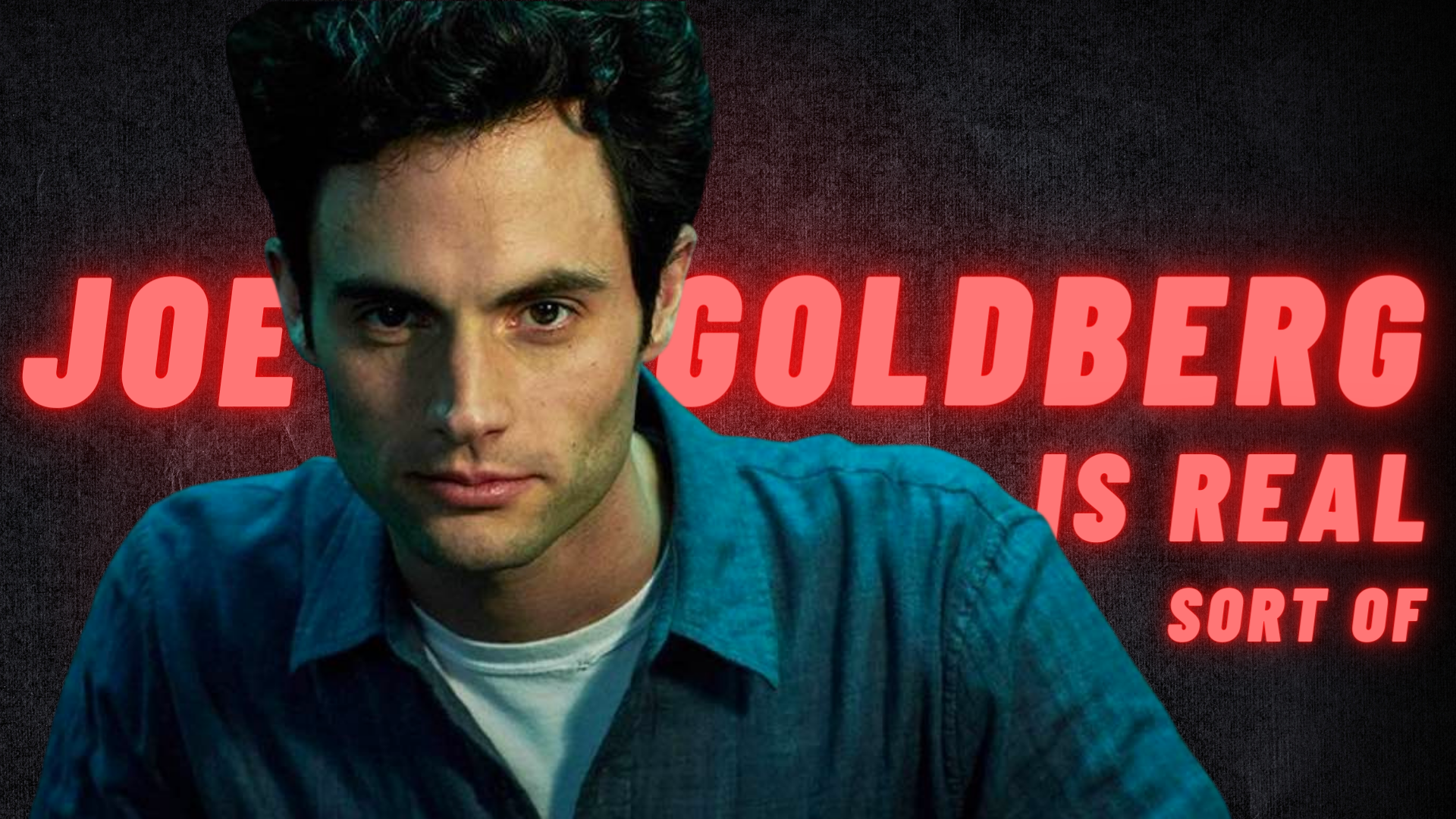By: Andrea Cipriano, MAFP and Lexi Kakis
Don’t be fooled by the attractive bookish depiction of Joe. He’s not one of the good guys, and neither are the men like him.
🚨 This piece contains spoilers for older seasons of the hit Netflix show, “You.” If you’re looking for more information on stalking awareness and prevention without spoiling the thrilling fiction series, check out another resource: Am I Being Stalked? Warning Signs.

While Joe may be gallivanting around a European city with a new identity and looking for another person to latch onto emotionally, we’re pretty confident that his stalking behaviors will persist…no matter where he is on Earth!
As you take a moment to wait for your popcorn to pop in the microwave before starting Part 1 of the new season, it’s essential to take a moment to revisit what the show has taught us about real-life stalking — and keep an eye out for more red flags.
Let’s be honest, Joe Goldberg will always be Joe Goldberg. While he may not be a real person, his character’s profile is. There’s nothing sexy or fun about a real-life stalker.
You is a psychological thriller — not a romance. Yet, throughout the series, Joe expresses his love in a style that says: “I would do anything for you,” appealing to a fantasy where most people want to feel innately special and be unconditionally “chosen” by a partner.
In Joe’s twisted mind, anything often means something criminal.
“I did a bad thing today but for a good reason, and if there is any justice in the world, you are the reward for all of my suffering,” Joe tells the audience after killing in Season 1.
Let’s not get his obsession twisted with healthy love.
According to the Victim Connect Resource Center, stalking is a pattern of stealth and obsessive attentive behavior that constitutes a threat, causing the victim to feel unsafe or fearful.
Gone are the days when someone would need to hide in the bushes outside of a house to keep tabs on someone inappropriately. With the far-reaching capabilities of social media, a predator can remain behind the screen for most of the harassment.
Common characteristics of stalking include sending unwanted or inappropriate communications and gifts, following someone persistently with or without their knowledge, damaging someone’s property or threatening their family or pets, and using technology to monitor or surveil someone.
In other words, stalking makes the target’s life a living nightmare.
Let’s take Joe Goldberg in Season 1 of You, for example.

Joe Goldberg (Penn Bagdley) and his growing infatuation with Guinevere Beck (Elizabeth Lail), Season 1.
While Joe is filling the audience’s mind with his thoughts about unrelenting love, in the plot, he fills Guinevere Beck’s and Love Quinn’s worlds with horror.
And yet, we feel closer to Joe — and care more about him — than the ladies he stalks. This is a red flag.
In Season 1, Beck never knew that Joe was following her the night she fell onto the subway tracks, or even that he stole her phone. She never knew that he was lurking on her every move through social media, reading her text messages, and hacking into her accounts. Beck didn’t know that Joe manipulated her inner circle of friends, and she didn’t realize he killed her best friend — until the very end.
We watched all of this in real-time…and still rooted for him.
Sadly, we all knew Beck’s death in the plot was coming. When Beck discovers Joe’s secret trophy box of stalking items in his bathroom ceiling tile, Joe knocks her unconscious, and Beck is met with an actual nightmare when she wakes up in his book cage.
While far-fetched in the story, this behavior escalation isn’t uncommon.
Research tells us that when offenders are backed into a corner and are about to get caught for their actions, they’ll “snap” under pressure and act erratically — grasping at whatever they can to maintain control.
For Joe, it was physically imprisoning Beck where he could see her. For real stalkers, escalation could look like vandalism, threats, or violence.
One Reddit user details how after she repeatedly denied an older man’s advancements while she was working at a restaurant chain, the man began eating there for multiple hours at a time just to stare at her. After being threatened with police intervention, the man broke into the girl’s car and hid in the back seat. Thankfully, he was arrested with possession of a butcher knife, rope, and a rag with chloroform.
This sounds like something Joe would do.
Joe, and this real-life example, fit the profile of a narcissistic stalker — the person who feels entitled to your time, attention, and admiration. When there’s a narcissistic injury, like a date denial, violence is often the avenue for manipulation.
You’s Seasons 2 and 3 tell a bit of a different story.
Fleeing from New York to Los Angeles after murdering Beck, Joe quickly sets his sights on Love Quinn, an aspiring chef at her family’s high-end grocery store, Anavrin. It’s obvious early on that Joe’s behaviors are not always motivated by genuine affection. Instead, he’s driven by power and control.

Love Quinn (Victoria Pedretti) in Season 2 of You in Joe’s affectionate crosshairs.
“You want to feel safe, dear, you want someone to make you pancakes,” Joe shares with the audience when he’s psychoanalyzing Love. Then, he makes a big proclamation when Love tries to distance herself from him: “I’m not an option, I’m the chosen one. Jealousy brought out the best in me.”
Joe would live in his partner’s skin if he could, just to keep an eye on her all the time.
In Episode 4 of Season 2, Love invites Joe over to her apartment. At that moment, Joe says to himself and the audience, “All the better to spy on you. Not that I’ve needed to, since I trust you completely.”
We know he never trusts Love — ever. Joe continues to use online and in-person methods of stalking, and he gets better each season.
In the age of social media, we don’t know where the line of infatuation ends, and obsession begins. What’s worse, it’s almost impossible to tell if someone is stalking your social media accounts unless the stalker wants you to know by liking posts repeatedly, or following and unfollowing you so you’ll see the notification.
How many characters have we seen Joe digitally “undress” by finding their obvious hobbies, locations, and social circle — as well as their secret lives, all behind the cover of his phone?
Speaking to the audience in Season 1 about Beck, Joe scrolls on social media, saying, “All your accounts are public, you want them to see you..to listen to you…to know you. And I thank you.”
Sophisticated stalkers in real life have the same skills.
While Love and Joe are broken up in Season 2, Joe researches her new love interest and even follows him on his job through the park. This is particularly terrifying, considering nearly half of all stalking cases involve stalking an ex-partner. Joe was looking for a way to sabotage their new relationship, just as master manipulators do off the screen.
Another Reddit user details how when she broke up with a guy in college, he showed up to one of her future dates. The stalker brought five of his friends with him, all of them physically attacking the new man. She also ended up with her “face smashed in for being a ‘cheating whore,’” even though they were not together.
Of course, through Seasons 2 and 3, we realize that Joe Goldberg and Love Quinn are a match made in hell…two stalkers who never trust each other but will kill for each other (literally) and fall into their own obsessive, paranoid tendencies shrouded in a false belief that they’re soul mates? There’s no denying it’s great TV.
But, as the Stalking Prevention Awareness and Resource Center (SPARC) notes, shows like You can be harmful if not balanced with depictions of healthy relationships.
“Many fans romanticize the Joe character and may not realize that stalking is scary,” SPARC details. “Entertaining shows can make stalking seem like the stuff of soap operas instead of a real issue that actually impacts many people.”
The most terrifying part about these 3 seasons is how easy it was for the audience to look past his predatory behavior and exploitation. Joe knew how to walk the line between good-natured, and a monster in the shadows.
His air of kindness softens our impression of him, and his “good side” attempts to mask the bad… just like stalkers in real life.
You is not just a dramatized cautionary tale of what could happen; instead, it displays all the shades of manipulation that happens to many victims. While the audience is so busy focusing on all the ways Joe exploits character after character, we don’t realize that Joe was also manipulating us the entire time.
Love this post? Meet the Authors.
Andrea Cipriano is a Case Researcher and Content Specialist at Uncovered, where she writes for the twice-weekly true crime newsletter, The Citizen Detective. She graduated with a Master of Arts in Forensic Psychology from John Jay College of Criminal Justice where she focused on researching and peeling back the criminal mind. Andrea believes that it’s never too late for justice.
Lexi Kakis is the Community Engagement Manager at Uncovered. Lexi studied Media Communications at Molloy University, where she focused on television production and content creation. She has since shifted her focus toward advocating for cold cases. Lexi believes that justice has no expiration.
